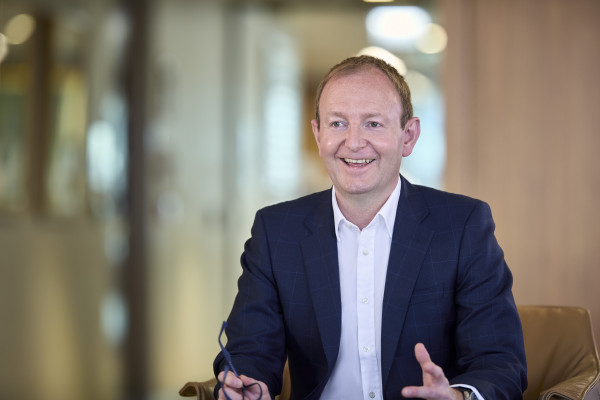

There have been several substantial deals in the past few years in asset management world, although the less-than-stellar performance of many of the merged entities means the merits of such deals are often called into question.
But the pressures that drove some of the mergers and acquisition activity in the UK, notably the rise of passive investment products and regulatory pressure on fees, have not gone away.
Many have merged to seek the scale of Blackrock, while the boutiques such as Fundsmith and Lindsell Train have also thrived, but the losers from this market could be those in the middle.
One of those at the front line of this problem right now is Mark Versey, chief executive of Aviva Investors.
Versey succeeded Euan Munro as chief executive of the business in January 2021.
Challenges for mid-sizers
Of the challenges of being a mid-sized player in a land of giants, he says: “It is very important that we stand out by focusing on what we are good at. And what we are good at is real assets and sustainable investing.
"What we were not good at is high alpha, unconstrained equity investing, so we do less of that. I think an issue in the past is we were trying to do too many things.”
Real assets, which covers such areas as infrastructure, is the department at Aviva Investors Versey ran prior to becoming chief executive.
He acknowledges that it is hardly original for an asset management company boss to be talking up the claims of his sustainable or broader ESG investment funds in the current climate, and says it is essential “that we have much better labelling. The term 'ESG' is too broad, it is a catch-all term.
"Some funds for example run what is called an exclusionary investment process, where they just choose not to invest in certain stocks, and that’s fine, but that approach is unlikely to create sustainable outcomes. That is something which needs to be looked at.”
Since taking the helm of the business, a number of funds have been merged or closed, and several fund managers, including the high-profile head of equities David Cumming, left the business.
Versey says the funds closed were in areas “where we were not seeing much client demand".
Aviva Investors total assets under management is £232bn, much of which comes from capital placed with it by the parent company, Aviva.
Munro’s exit and Versey’s elevation to the chief executive role appeared to happen very suddenly, with the announcement taking even some Aviva colleagues by surprise.
But Versey and Munro had known each other long before each worked at Aviva – Versey was directly hired for his role as chief investment officer for real assets by Munro, and was the designated successor to Munro as chief executive in the company’s own succession plan.
Of the experience of being, for the first time in his career, a chief executive, Versey says: “The biggest thing that's different is all of the committees and boards I now sit on, that was the biggest adjustment.”
Fund fees and star managers
He says the challenge facing all mid-sized active fund management houses is that “fees will continue to fall”, and so the challenge for firms such as his will be to be more efficient. He says this is also part of the rationale for the redundancies and reducing the number of funds by several dozen.
Versey says: “In this market a fund house can no longer have five funds that basically do the same thing, which was probably the case here. By merging funds together, you get a bit more scale, and that means you can run them more cheaply.”
The company has acknowledged that some of its fees were high, but they did cut the fees on five of its products in February 2020.
David Cumming, the former head of equities at Aviva Investors who was made redundant last year, was regarded by many in the industry as a prototypical “star” fund manager.
Versey’s view is that such a concept is now outdated.
He says: “In truth, investment management has always been a team effort, even if that wasn’t always acknowledged, but in future I think firms will emphasise the strength of the whole team.
"And to be honest, as more funds embrace ESG in one form or another, well, you need to have a dedicated person doing the work on the companies' ESG credentials, and a different person to do the work on the investment case for the company. No one person can do both of those jobs.”
Versey’s entry to the world of asset management came somewhat by accident, having trained as an actuary.
He says: “One of the jobs I was given was to work on the valuation of Scottish Widows when it was acquired by Lloyds. And it was that work which got me interested in asset management as an industry. I decided at that point that was the career I wanted.”
Versey then worked in both equity and fixed income roles at various investment investment banks earlier in his career, before becoming a chief investment officer.
He says being the pre-determined successor to the previous chief executive meant he was familiar with many aspects of the chief executive's role before he formally stepped into the hot seat, and says this made the transition much easier.
He acknowledges that it is very unusual for an individual to work separately in fixed income and in equities. He began his investment career on the equity side, but felt his training as an actuary was more suited to the fixed income landscape.
Despite the spate of turnover activity and Aviva Investors' positions in the market, it may be too large, and too intertwined with its parent insurance company, to be a takeover target during the present wave of industry consolidation.
But Versey’s attempt to fix the performance of a business that many be regarded as a laggard within the industry will be keenly watched as a potential example for others to follow.
David Thorpe is special projects editor of FTAdviser



